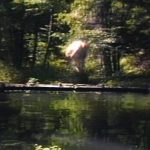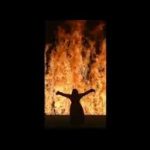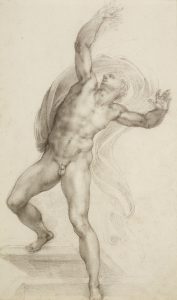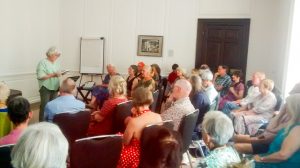
Last summer, Mark Oakley, who was at that stage still Canon Chancellor of St Paul’s Cathedral before his move to Cambridge, invited me to the cathedral to see the two Bill Viola installations/films there. ‘Martyrs: Earth, Air, Fire, Water’, was installed in the cathedral in 2014. Set across four vertical plasma screens, it depicts four individuals being martyred by the four elements. The work is silent and deeply moving.

The second video, ‘Mary’, was installed in the cathedral in 2016, and is a celebration of women, using depictions of Everywoman. I found both artworks extremely moving, so jumped at the opportunity to visit the Royal Academy last week for their exhibition, ‘Bill Viola and Michelangelo: Life Death Rebirth’.
Despite mixed reviews, the exhibition did not disappoint. The main exhibits were by Bill Viola, but they were accompanied by a number of small drawings by Michelangelo. Both artists, of course, demonstrate the beauty and power of the human body, particularly the male body. Michelangelo’s specific meditations on the Resurrection become, in Viola’s work, celebrations of both transformation and physical rising.


The theme of water is so universally present in these works that it almost appears to be an obsession, but it is clearly a metaphor both for life and also for transcendence. Walking through the semi-darkness, watching the videos, some of which take around a quarter of an hour to play, one is transported into  Viola’s world and receives a glimpse of his spiritual awareness. The cleansing of one’s normal attention also made the Michelangelo drawings that much more striking, as one became conscious of the way in which the artist conveys so much of the important essence of the figures with so few strokes of the brush or pen, whether it be a depiction of Christ’s crucifixion, the risen Christ (pictured right) or the tenderness of a nativity scene.
Viola’s world and receives a glimpse of his spiritual awareness. The cleansing of one’s normal attention also made the Michelangelo drawings that much more striking, as one became conscious of the way in which the artist conveys so much of the important essence of the figures with so few strokes of the brush or pen, whether it be a depiction of Christ’s crucifixion, the risen Christ (pictured right) or the tenderness of a nativity scene.
Before I went into the exhibition, a couple of men in the café told me that they had got round it in 10 minutes. I was therefore surprised to find myself still in the darkened rooms after an hour an a half; and even more surprised to find that the images, and Bill Viola’s meditation on life and transcendence, travelled with me when I left.
Comments closed Most of you probably know that I am a huge fan of Ways with Words, the literature and ideas festival that’s held at Dartington Hall in Devon every July. It was started in 1991 by Kay Dunbar and Steve Bristow, who ran it every year until they took a back seat this year, handing it on to their fantastic staff, Leah, Jane and Phil, to keep up the good work
Most of you probably know that I am a huge fan of Ways with Words, the literature and ideas festival that’s held at Dartington Hall in Devon every July. It was started in 1991 by Kay Dunbar and Steve Bristow, who ran it every year until they took a back seat this year, handing it on to their fantastic staff, Leah, Jane and Phil, to keep up the good work


 Mark Oakley is Canon Chancellor at St Paul’s Cathedral, though he will be moving at the end of next month, to take up the post of Dean of St John’s College, Cambridge. He is also a poetry-lover, with a keen ear and discriminating mind. In his recent book, ‘The Splash of Words: Believing in Poetry’, he has selected and presented twenty-nine poems, from all ages and in all forms, in each case then going on to a wide-ranging discussion of the work, his response to it, and his personal and faith journey. It makes riveting reading, and because practically all the poems are ones I have loved for years, reading it was like meeting up with old friends and forming an even deeper acquaintance with them.
Mark Oakley is Canon Chancellor at St Paul’s Cathedral, though he will be moving at the end of next month, to take up the post of Dean of St John’s College, Cambridge. He is also a poetry-lover, with a keen ear and discriminating mind. In his recent book, ‘The Splash of Words: Believing in Poetry’, he has selected and presented twenty-nine poems, from all ages and in all forms, in each case then going on to a wide-ranging discussion of the work, his response to it, and his personal and faith journey. It makes riveting reading, and because practically all the poems are ones I have loved for years, reading it was like meeting up with old friends and forming an even deeper acquaintance with them.